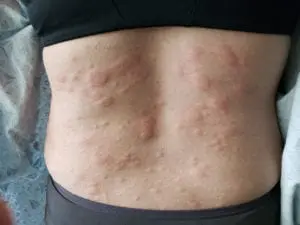 Chronic Hives Treatment
Chronic Hives Treatment
You may ask what kind of doctors treat hives. The answer is: dermatologists, the doctors who treat conditions of the skin, hair and nails.
Diagnosing Hives
A dermatologist can usually diagnose hives by examining the rash with raised red bumps that usually appears on the skin’s surface. Hives can be very itchy and cause discomfort. Determining the cause of hives can be difficult, especially if the hives have persisted for over six weeks. To determine the cause of the hives, a dermatologists assesses the patient’s medical history, ask questions, and conducts a physical exam. Causes may include stress, temperatures and sun exposure, an allergic reaction, medications, or other factors. Hives can affect a person at any age from infants to adults. The question we hear from patients when they visit our office is, “How do I get rid of my hives?” Getting rid of hives altogether involves determining what triggered the hives in the first place. Treatment can often bring rapid relief to the patient.
How do dermatologists treat hives?
Mild to moderate cases of hives are usually treated with a non-sedating (does not cause the patient to become drowsy) antihistamine. Antihistamines offer relief from symptoms such as itching.
In addition, antihistamines are prescribed for the treatment of chronic (persisting for over six weeks) hives. When prescribed for chronic hives, the patient will take this drug daily to prevent the formation of hives. Many antihistamines are available today. Some cause drowsiness while others don’t.
The dermatologist may prescribe the following medications for the treatment of hives:
- Antihistamines
- Corticosteroids like prednisone: For short term use due to side-effects with use in the long-term
- Dapsone: An antibiotic for relief from swelling and redness
- Omalizumab: An injectable drug to treat chronic idiopathic urticaria (CIU), a form of hives that can manifest for months, or even years.
- Other drugs that address inflammation
Patients may require epinephrine (shot of adrenaline) for certain types of hives or angioedema, which is a condition that is similar to hives (but the inflammation occurs deeper in the skin). All drugs have potential side effects, and the patient should ask their dermatologist about these side effects.
Treatment for Chronic Hives
Two medications, namely, antihistamines and omalizumab have received approval from the US Food and Drug Administration for the treatment of a type of chronic hives known as CIU, which can persist for six weeks or more, and at times, even last for years.
Research indicates that up to 50 percent of individuals with CIU continue to develop hives following treatment with antihistamines. In some people with CIU, Omalizumab (injected under the skin) has been proven to relieve the itch and clear hives.
According to one research study, 36 percent of patients who received treatment with omalizumab reported no itch and no hives following the treatment.
Results
Hives are not serious for most people. In time, children may outgrow the allergies that lead to the development of hives.
Certain individuals with chronic (lasting over six weeks) hives, experience that the hives resolve by themselves, usually within a year. But many people with chronic hives experience that the hives come and go for months or years.
In case the hives do not go away or become severe, it is essential to get medical care. Hives can indicate an internal disease. Some individuals experience severe inflammation.
People who have hives and trouble swallowing or breathing should seek prompt medical care.
Tips for Managing Hives
People with a mild case of hives may not need treatment. They can often get relief from itching by applying cool cloths to the hives, or by taking cool showers.
In case the patient has a bad allergic response, such as shortness of breath, they should talk to their doctor about a prescription drug known as an “auto-injector.” When injected into the thigh, this medication stops the allergic reaction.
SunCoast Skin Solutions Dermatology offices are located in Tampa / Hillsborough, St. Petersburg / Pinellas County , Brandon, Lutz, Winter Haven, Largo, Riverview, Brooksville, Ocala, Sarasota, Palm Harbor and Daytona Beach Florida. Contact us at 1-844-786-3376 or click here.

Recent Comments